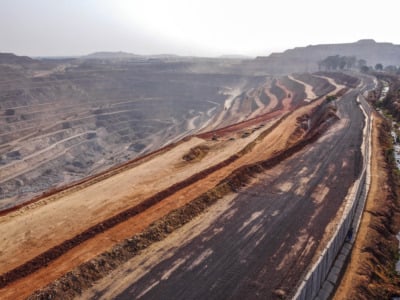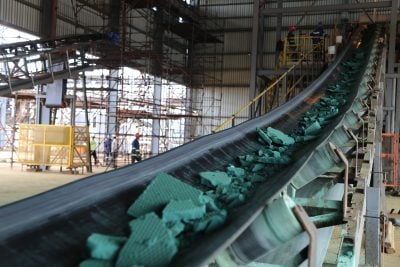COP28 comes at a key juncture. Time is now very close to running out in efforts to achieve the Paris Agreement goal of limiting the rise in temperatures to 1.5 degrees Celsius above pre-industrial levels.
Across Africa, the impacts of climate change are becoming more and more apparent. In September, several thousand people died in Libya when torrential rain caused two dams to collapse. Algeria and Tunisia endured some of their highest ever temperatures, approaching 50 degrees Celsius, during this summer’s heatwave. And the Horn of Africa is only just recovering from a lengthy drought after several failed rainy seasons.
But Africa also holds many of the tools that the world needs to accelerate the energy transition. Large swathes of the continent enjoy excellent conditions for renewable energy, particularly solar power. Europeans are increasingly looking to the Sahara’s solar resources to fill their own energy needs, yet Africa also has an unprecedented opportunity to use its renewable endowments to power a green industrial revolution within the continent.
Many of the key planks of Africa’s negotiating position at COP28 were agreed at the inaugural Africa Climate Summit, held in Nairobi in September. The Nairobi Declaration that arose from the summit called on the global community “to act with urgency in reducing emissions, fulfilling its obligations, honouring past promises, and supporting the continent in addressing climate change.”
Priority number one for African leaders at COP28 will be to persuade industrialised countries to implement previously agreed promises on providing finance to help developing countries adapt to the worst impacts of climate change. Progress towards agreeing frameworks for governing carbon markets will also be high on the agenda, although the continent will find it harder to agree a common position in the inevitable debate on “phasing out” or “phasing down” fossil fuels.
Related articles
- COP is stuttering, but it’s still crucial for the world
- COP28 could be ‘game-changer’ for least developed countries – UNCTAD
- Can Africa’s infrastructure survive the climate crisis?
Delivering on climate finance
Africa’s position at COP28 could be summarised with the phrase: “give us the money you promised”.
The main focus for African delegations in Dubai will simply be on ensuring that promises made at previous COPs are fulfilled.
Chief among these is the pledge, dating all the way back to the COP15 summit in Copenhagen in 2009, to provide $100bn a year in climate finance for developing economies. Similarly, the Loss and Damage Fund agreed amid much fanfare last year in Cairo, has not yet been brought into operation.
Africa’s negotiating position on climate finance is fuelled by a sense of injustice. Most African countries have made negligible contributions to global warming but are facing severe impacts from droughts, extreme weather and other climate change impacts. As the Nairobi Declaration put it: “Africa is not historically responsible for global warming, but bears the brunt of its effects, impacting lives, livelihoods, and economies.”
Carbon accounting non-profit CDP says that Africa’s share of current global emissions is just 3.8%, compared to 23% for China and 19% for the US. The African Development Bank’s chief economist, Kevin Urama, said last year that Africa’s per capita GDP growth is 5-15% lower because of climate change.
Even the undelivered $100bn Copenhagen pledge falls far short of what is actually needed. According to a report published last year by the Independent High-Level Expert Group on Climate Finance, emerging economies (other than China) will need to spend $2.4 trillion a year on addressing climate change by 2030.
COP27 established a transitional committee to work out how to bring the Loss and Damage Fund – intended to provide finance to low-income countries that face particularly severe impacts – into being. The committee is due to present its recommendations at COP28.
UN trade body UNCTAD argued in a recent report that the Loss and Damage Fund should receive a minimum level of annual contributions, and said that contributions should not be diverted from other schemes. The report added that the fund should be brought into being within the next year and that contributions should take the form of grants, rather than loans.
African delegations at COP will undoubtedly make a concerted push for these recommendations to be made into a reality. Foot-dragging from the world’s richest countries – most of which have cut their international development funding in recent years – is sure to provoke a diplomatic firestorm.
Proposals for a “carbon tax” on international financial transactions, which would generate funding for climate adaptation and mitigation, are also likely to be discussed at COP. African governments agreed at the Africa Climate Summit that world leaders should “consider” such proposals, although it is unclear whether the idea can gain traction in Dubai amid reluctance from wealthy nations.
Scaling up carbon markets
Another key priority for Africa at COP28 will be to secure agreement on scaling up carbon markets.
Africa has some of the world’s greatest potential for removing carbon through its forests, mangroves, savannahs and other “natural assets”. The carbon markets potentially provide a way for the continent to monetise these services to the planet. Through the carbon markets, organisations that carry out activities such as planting trees can generate revenue from carbon credits, which are typically sold to corporates that are trying to reduce their emissions in line with net zero goals.
However, the carbon markets are at a crossroads. The credibility of carbon offsetting has come under attack over the past year following high-profile media reports on schemes with seemingly severe methodological flaws. This has contributed to a sharp fall in the price of voluntary carbon credits, meaning it is less economically viable to rehabilitate or preserve natural ecosystems with the aim of generating revenues through credits.
On the other hand, many actors continue to see value in the carbon markets. The UAE is particularly enthusiastic (perhaps, as critics suggest, because carbon offsetting allows the COP28 host to justify its continued oil production). A consortium of UAE investors pledged to purchase $450m worth of credits through the African Carbon Markets Initiative in September.
As a result, the carbon markets are sure to feature prominently at COP28. One of the key tasks for delegates will be to resolve issues around Article 6 of the 2015 Paris Agreement. This introduced various arrangements for governing the carbon markets – but finalising all the extremely complex rules around these has proven to be a tortuous process.
If delegates can make a breakthrough in Dubai, Africa’s carbon markets could be ready for take-off.
Phasing out fossil fuels
Africa will have little difficulty in maintaining a united front around climate finance and carbon markets, but the continent will find it harder to agree a common position on phasing out fossil fuels.
Recent COPs have featured fierce debate on setting a timetable to end the burning of coal, oil and gas. At COP26 in Glasgow two years ago, delegates eventually agreed a linguistic compromise on fossil fuels in which the phrase “phasing out” was replaced with language on “phasing down”.
The fact is that different countries have divergent interests on the issue of phasing out fossil fuels. Gulf states, for example, are heavily dependent on oil and gas income and have little desire to cut off their critical source of revenues.
The divisions at the global level are mirrored within Africa. Many governments ask why they should not be allowed to monetise oil and gas reserves, given that other parts of the world have grown rich through doing so. With 600m people in Africa lacking access to electricity, it is certainly hard to argue in favour of leaving these resources in the ground.
On the other hand, it would be fair to point out that arguments in favour of monetising oil and gas are often made by actors with a financial interest in these resources being exploited. African countries that lack oil and gas reserves but are highly exposed to climate change impacts are less likely to be enthusiastic about delaying the fossil fuel phase-out. No African countries have yet signed onto the Fossil Fuel Non-Proliferation Treaty being backed mostly by Pacific island states, but this proposal is likely to re-emerge at COP28.
More positively, African countries can agree on the need for more funding for renewable energy on the continent. The International Energy Agency estimates that Africa only attracted 2% of global clean energy investment last year, despite possessing the world’s best renewable resources.
South Africa and – more recently – Senegal have signed Just Energy Transition Partnership (JTEP) agreements, which are designed to encourage international financing for green energy investments. In South Africa’s case, however, the JETP agreement has proven controversial, with many government ministers preferring to protect the coal industry rather than accept international loans to scale-up renewables.
Nevertheless, African governments made clear through the Nairobi Declaration that they are ready to make a positive case around Africa’s readiness to be part of the solution to climate change. “We urge global leaders to join us in seizing this unprecedented opportunity to accelerate global decarbonisation, while pursuing equality and shared prosperity,” they said.
Want to continue reading? Subscribe today.
You've read all your free articles for this month! Subscribe now to enjoy full access to our content.
Digital Monthly
£8.00 / month
Receive full unlimited access to our articles, opinions, podcasts and more.
Digital Yearly
£70.00 / year
Our best value offer - save £26 and gain access to all of our digital content for an entire year!

 Sign in with Google
Sign in with Google 



